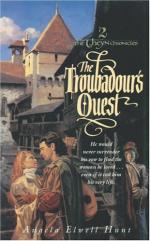|
This section contains 6,663 words (approx. 23 pages at 300 words per page) |

|
SOURCE: Klassen, Norman. “Self-Reflexiveness and the Category of the Will in Early Troubadour Poetry of Fin' Amors.” Forum for Modern Language Studies 34, no. 1 (January 1998): 29-42.
In the following essay, Klassen examines the complex relationship between the poet's “I” and the lover's “I” in troubadour poetry.
A number of recent studies have drawn fresh attention to the complexity of twelfth-century troubadour poetry. Linda Paterson's recent comprehensive introduction to Occitan society highlights the linguistic diversity of the region given that name;1 she and others have also explored the subtle variations in troubadour poetry that accompany differences in poetic taste, political pressures, and local rivalries from Limoges to Aix.2 In spite of this diversity, and in some ways because of it, poetic self-reflexiveness recurs insistently as a common theme. The troubadours of southern France set an important precedent in drawing attention to their own creativeness, in competing in a contest of...
|
This section contains 6,663 words (approx. 23 pages at 300 words per page) |

|


